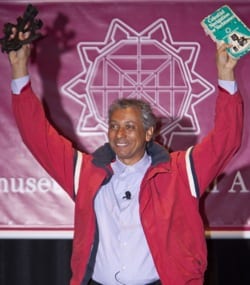Who is a member?
Our members are the local governments of Massachusetts and their elected and appointed leadership.
 Neal Petersen drew on the obstacles he faced on his way to becoming an elite solo sailor as a means to encourage local officials to promote change and leave behind legacies they can be proud of.
Neal Petersen drew on the obstacles he faced on his way to becoming an elite solo sailor as a means to encourage local officials to promote change and leave behind legacies they can be proud of.
“We all face challenges,” the MMA Annual Meeting’s keynote speaker told an audience of 750 city and town officials on Jan. 25. “But we have to adapt, to modify. If we cannot embrace change, we will never find our way to prosperity.
“You do whatever you have to do,” he said, “to support your dreams and your goals.”
In 1999, Petersen became the first person of African descent to complete the 27,000-mile “Around Alone” race, the longest individual race in any sport. Petersen, who grew up in South Africa, had to overcome not only racial segregation but also a childhood disability that required multiple hip surgeries as well as poverty that was made worse by his father’s alcoholism.
But rather than becoming bitter, Petersen said, he came to regard the obstacles he faced as “a treasure chest.”
“If you choose to carry no chips on your shoulder,” he said, “then nothing is impossible.”
Petersen recalled as a child in Cape Town entering a whites-only library because the library for blacks had no books about sailing.
“I would read the books in the aisles,” he said. “And one day I found the courage to check out a book. The librarian did not see the color of my skin. She saw a dreamer, she saw ambition.”
In the library reserved for those of light skin, Petersen said, he came across a book that changed his life: “Sailing Alone Around the World,” written by Joshua Slocum, an adventurer from Fairhaven, Mass., in 1895.
Petersen said he became seasick his first time on board a sailboat, but he learned to overcome the condition by being actively involved with navigating the vessel (following advice that he found in Slocum’s book).
After finishing high school, he made plans to attend a noted commercial diving training program in Los Angeles, nearly halfway around the world. But even among his friends he encountered derision.
“They said, ‘You’re not going nowhere,’” Petersen recalled. “‘You’re going to [work in] the factories. And you’ll probably become an alcoholic like your father.’”
Petersen did become a successful diver, working in areas such as the Gulf of Mexico and the North Sea. But apartheid limited his ability to pursue such work in his homeland.
When he turned his attention fully to long-distance sailing, he found he could not compete financially with more established sailors, many of whom had sponsors. When he attempted for the first time to sail across the Atlantic Ocean, he could not even afford a GPS unit. Instead he used a sextant, a celestial-navigational device that dates back to the time of Ferdinand Magellan. Petersen failed to reach England, and said he was fortunate to survive the journey.
One of the keys to Petersen’s ultimate success in his nine-month “Around Alone” race, he said, was meeting Harry Mitchell, an acclaimed British sailor who became an important mentor.
“A wise person learns from his mistakes,” Petersen said. “But a smart person finds an older person so he will not repeat that person’s mistakes.”
Petersen attributed Mitchell’s success as a sailor partly to his passion, a quality he suggested local officials should keep in mind when hiring managers and other employees.
Petersen is the author of two books, his 2004 autobiography “Journey of a Hope Merchant: From Apartheid to the Elite World of Solo Yacht Racing” and “No Barriers,” a phrase that figures prominently in his motivational speeches.